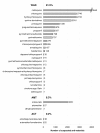Assessment of global reporting of adverse drug reactions for anti-malarials, including artemisinin-based combination therapy, to the WHO Programme for International Drug Monitoring
- PMID: 21388536
- PMCID: PMC3063823
- DOI: 10.1186/1475-2875-10-57
Assessment of global reporting of adverse drug reactions for anti-malarials, including artemisinin-based combination therapy, to the WHO Programme for International Drug Monitoring
Abstract
Background: In spite of enhanced control efforts, malaria remains a major public health problem causing close to a million deaths annually. With support from several donors, large amounts of artemisinin-based combination therapy (ACT) are being deployed in endemic countries raising safety concerns as little is known about the use of ACT in several of the settings where they are deployed. This project was undertaken to profile the provenance of the pharmacovigilance reporting of all anti-malarials, including ACT to the WHO adverse drug reaction (ADR) database (Vigibase™) over the past 40 years.
Methods: The WHO Programme for International Drug Monitoring, the Uppsala Monitoring Centre (UMC) provided anonymized extracts of Vigibase™ covering the period 1968-2008. All countries in the programme were clustered according to their malaria control phase and income status. The number of individual case safety reports (ICSRs) of anti-malarials was analyzed according to those clusters.
Results: From 1968 to 2008, 21,312 ICSRs suspecting anti-malarials were received from 64 countries. Low-income countries, that are also malaria-endemic (categorized as priority 1 countries) submitted only 1.2% of the ICSRs. Only 60 out of 21,312 ICSRs were related to ACT, 51 of which were coming from four sub-Saharan African countries. Although very few ICSRs involved artemisinin-based compounds, many of the adverse events reported were potentially serious.
Conclusions: This paper illustrates the low reporting of ADRs to anti-malarials in general and ACT in particular. Most reports were submitted by non-endemic and/or high-income countries. Given the current mix of large donor funding, the insufficient information on safety of these drugs, increasing availability of ACT and artemisinin-based monotherapies in public and private sector channels, associated potential for inappropriate use and finally a pipeline of more than 10 new novel anti-malarials in various stages of development, the presence of well functioning national pharmacovigilance systems is vital to ensure safe and responsible scale up of ACT deployment. Bringing together the competencies of national pharmacovigilance centres and various types of organizations in the NGO, academic and private sectors with global coordination to create short- and long-term solutions may help address the lag between rapidly growing ACT use and poor ADR reporting.
Figures





References
-
- WHO. World Malaria Report 2009. Geneva; 2009.
-
- Gallup JL, Sachs JD. The economic burden of malaria. Am J Trop Med Hyg. 2001;64(1-2 Suppl):85–96. - PubMed
-
- WHO. Antimalarial Drug Combination Therapy, report of a WHO Technical Consultation. Geneva; 2001.
-
- Jagoe G. 2nd Global Health Supply Chain Summit. Zaragoza, Spain; 2009. Monitoring and Improving the Flow of ACTs in the Public Sector: Medicines for Malaria Venture;
MeSH terms
Substances
LinkOut - more resources
Full Text Sources
Medical
Research Materials
Miscellaneous

